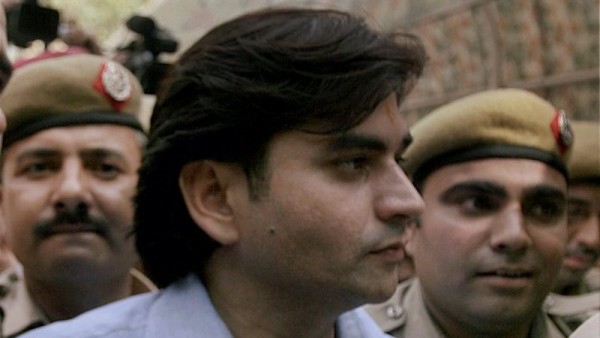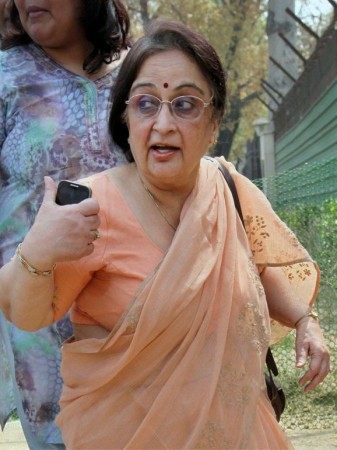Neelam Katara has fought a dogged battle for 14 years to ensure justice for her murdered son and it seems she has finally reached the end of her struggle. Recognising the odds she faced the court censured the killers for using their “influence” to delay and derail the trial by misleading investigators, destroying evidence and pressurising witnesses. The high court ruling makes it clear that Vikas Yadav and his cousin Vishaal Yadav murdered Nitish Katara not only because they were opposed to his “association” with their sister Bharti, but it was also an honour killing as they were motivated by caste and class differences.
The Delhi High Court Wednesday upheld the life imprisonment awarded to Vikas and Vishal Yadav, the son and nephew of controversial UP politician DP Yadav, for the murder of Nitish Katara murder and termed the case as an “honour killing”.
A division bench of Justice Gita Mittal and Justice J.R. Midha dismissed the appeals of the three against a trial court verdict of May 2008 which awarded them life imprisonment for abducting and killing Nitish Katara in 2002.
The bench posted for April 25 the appeal of Katara’s mother Neelam Katara who sought death sentence to the three convicts – Vikas Yadav, brother of Katara’s friend Bharti, and Vishal Yadav, Bharti’s cousin, and contract killer Sukhdev Pehalwan – who are serving life terms in the Tihar Central Jail here.
According to the prosecution, Vikas and Vishal killed Katara on the night of Feb 17, 2002, after abducting him from a marriage party in Uttar Pradesh’s Ghaziabad, as they were opposed to his friendship with their sister Bharti Yadav.
In the 1,193-page verdict, the high court bench held that Nitish Katara’s murder was an “honour killing” and that this case again brings to the fore a “malaise” which afflicts Indian society.
“What is of special concern is that such divisive forces exist even on the borders of Delhi – the nation’s capital, which is also a cosmopolitan city,” the court observed.
“The case of the prosecution squarely brings the murder of Nitish Katara within the meaning of the expression of honour killing,” it said.
“It is in evidence that Bharti’s family was opposed to her association or any kind of alliance with Nitish Katara on the ground that he was not from the same caste and that he belonged to a service class family.” The high court observed that, “While she was a Yadav, Nitish was a Katara. Bharti came from a well placed business class family with her father also being a member of parliament. Nitish Katara’s father was in government service and they lived in official accommodation. Nitish Katara was certainly not in the same income bracket of Bharti’s family,” the court observed.
The court also pulled up the Yadav brothers for their attempt to delay the case and for mocking at every direction passed by the trial court during the trial of the case. It said that because of their “influence”, it took their sister Bharti Yadav three and half years to enter the witness box.
The bench also said that the Yadavs made every possible effort to avoid the appearance of Bharti, a material witness before the trial court, which resulted in a substantial delay in the trial as well as “pressurised her into withholding material evidence and giving testimony which was prevaricatory and false”.
It added: “The time has come that an inference needs to be drawn against the accused persons who deliberately were misleading investigators; suborn witnesses; destroy evidence; win over crucial witnesses; protract the trial so that crucial evidence is lost or forgotten by witnesses.”
The high court also refused to give credence to a sting operation “discrediting” the testimony of key witness Ajay Katara and instead relied on his statements given in court while upholding the conviction.
“We agree with the trial judges that it is a testimony of the witness in court recorded on May 31, 2003 and July 27, 2007 respectively which has to be accepted. The sting operation carried out in 2008 is unreliable and does not have any evidentiary value,” it said.
It said that even if the affidavit filed by Ajay Katara to explain his position in the sting operation was to be ignored, the sting operation allegedly conducted on him is of no legal consequence and effect, and deserves to be discarded.
“It is well settled that it is the testimony given by the witness during the trial which has to stand. In the instant case, the witness had testified not once, but has given identical testimony in two trials, the first on May 31, 2003 (In Vikas and Vishal Yadav’s trial) and thereafter more than four years later, on July 27, 2007 in Sukhdev’s trial.
“Despite passage of four years and extensive cross examination, the witness remained unshaken. No contradictions between his two statements could be pointed out by the appellants. The vehement reliance on the sting operation on behalf of the appellants is, therefore, misconceived and has to be rejected,” it said.
Vishal was convicted in 2008 along with his cousin Vikas for kidnapping and murdering Katara, son of an Indian Administrative Service officer. The Yadavs had sought a re-trial of the case, saying the trial was not conducted in accordance with law. (IANS)
 Face of a killer: Vikas Yadav convicted of murdering Nitish Katara
Face of a killer: Vikas Yadav convicted of murdering Nitish Katara 